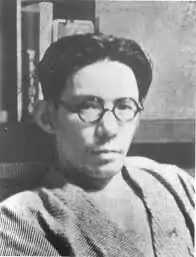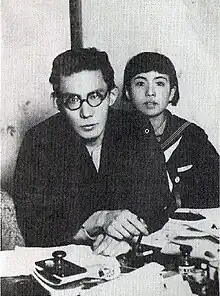Mushitarō Oguri | |
|---|---|
 Mushitarō Oguri. | |
| Born | Eijirō Oguri 14 March 1901 Kanda, Tokyo, Japan |
| Died | 10 February 1946 (aged 44) Chiyoda, Tokyo, Japan |
| Occupation | Author |
| Genre | Detective stories |
| Notable works | Black Death Hall Murders Perfect Crime |
Mushitarō Oguri (小栗 虫太郎, Oguri Mushitarō, March 14, 1901 – February 10, 1946), born Eijirō Oguri, was a Japanese author and an important mystery novelist in pre-war Japan.[1]
Biography
Oguri was born in Kanda, Tokyo. His father died in 1911, and the family managed to support themselves financially thanks to the support of the main family branch and the income from renting a house.
In September 1922, Oguri began working at a printing press. During this period, he took interest in literature, and during the four years he worked there, he wrote a series of detective novels and stories: Aru Kenji no Isho, Gen'naiyaki Rokuju Kazuhisa, Benigara Rakuda no Himitsu and Madōji. These last three works would later be published in 1936 (Aru Kenji no Isho was published in 1927).

Major works
Oguri's major works include:
- Black Death Hall Murders (Kokushikan Satsujinjiken, 黒死館殺人事件)
- Perfect Crime (Kanzen Hanzai, 完全犯罪)
According to researcher Sari Kawana, he was one of the authors involved in writing "mad scientist murders," a subgenre within the larger stream of Japanese detective fiction during the 1920s and 1930s. He used the motif of the "mad scientist" and his uncompromising attitude toward his work to criticize the widespread overconfidence in the possibilities of science and to highlight the potential incompatibility between science and ethics. Other writers involved in that genre were Kozakai Fuboku, Yumeno Kyusaku, and Unno Juza.[2]
See also
Notes
- ↑ see http://en.tezuka.co.jp/manga/sakuhin/m010/m010_01.html
- ↑ Society for Japanese Studies, Volume 31, Number 1, Winter 2005 – See http://www.glocom.org/books_and_journals/journal_abstracts/20050513_ja_s193/index.html